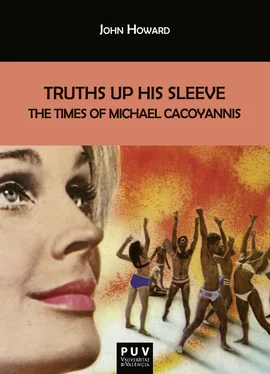No small feat, Michael entered law school and adjusted to its routines with ease in his first year. Gray’s Inn waived an entrance exam, as Michael’s recommendations and high school transcript were exceptional. The florid Greek Gymnasium diploma, signed by the headmaster plus twenty tutors and officials, confirmed he graduated with flying colors. Of eleven subjects, he passed all, even gymnastics and scripture, with a perfect 10, except one, ancient Greek! (That score of 9—“very well”—yielded a no less admirable 9.91 grade point average for the future interpreter of Euripides.) With Stella’s help, Michael managed to strike a nice balance of work and leisure at Gray’s Inn, following her exemplary study habits. During the week, Michael attended classes and studied at the Inn library, as the boardinghouse was far too noisy. Under the library’s sweeping arches, with sixteen bays below plus sixteen above in twin galleries, he more often than not found a quiet spot and an empty chair. Michael took study breaks on the Walks, the Inn’s private gardens laid out over several acres in 1608 by Francis Bacon. Under the towering plane trees, Michael could stroll the pea-gravel paths, sit and chat with other students, or play tennis—when it wasn’t raining or freezing. Checking out the Cypriot, Egyptian, Greek, and Roman antiquities a few blocks west at the British Museum, Michael no doubt used its round reading room on occasion too. At weekday’s end, Michael returned to Lexham Gardens before or after Stella, but in time for dinner. At weekends, Stella and Michael saw a play or movie, went dancing, even dined out now and again. But their budget was tight. As their father reminded them via their mother’s letters, they should eat at home, since meals were included. 9
By the start of Michael’s second academic year, Stella had returned to Cyprus, and France and the United Kingdom had declared war on Germany. Michael lodged with first one family then another in Hampstead. Seeing the sights of north London—Primrose Hill, Alexandra Palace, Highgate Cemetery, with Marx’s tomb—he let his study regimen slip a bit without Stella. In her absence, Michael struck up a close friendship with fellow law student Chrysanthe Clerides from Nicosia. As her father too was a lawyer, Michael understood that any outrageous misbehavior would get back to his own father, one way or another. Yet opportunities to misbehave surrounded him. A vast hilly woodland roughly the size of New York’s Central Park, Hampstead Heath doubtless enticed Michael with its longstanding reputation for easy intercourse among men at night. Even by day, quick sex could be had at its sex-segregated swimming ponds and in its remote leafiest corners. 10
As biographer Donald Spoto has written about bisexuality in London at midcentury, “protracted virginity has perhaps never been found in vulgar profusion among worldly young men.” Referring to theatre people, he added “a healthy, handsome and amiable [fellow,] living and working amid a freewheeling crowd of bold young hopefuls, must have had some initiation into the carnal life. More to the point, he would have been thought remarkably strange had he kept a monastic discipline in this regard.” No stranger to sex, Michael had been initiated as an early teen in Cyprus, learning to masturbate with a male cousin. There is no evidence to suggest that he thereafter masturbated alone, or that his sexual experimentation with male friends and cousins stopped at masturbation. Common sense and the history of sexuality suggest otherwise. On the record, late in life, Michael stated that he had an affair with a friend’s wife at this time in London. The photograph he offered as proof is comical if not camp, perhaps as intended. In the black-and-white snapshot, the two stand apart, outdoors in summertime, not touching. Both have left leg cocked, but Michael’s shorts are shorter than hers, recalling his boyhood family portrait. Whereas she looks comfortable, smiling, arms at her side, he seems anxious, arms folded, left hand at his throat, as if clutching his pearls. Though his father might wish it away, many Londoners perceived what he too was beginning to accept: Michael was gay. 11
Whatever the distractions, Michael wanted to finish law school right away, because he didn’t “really care about the law.” Even as the German bombing of London began in 1940 and blackouts forced the library and common room to close early every afternoon, he persevered. He completed his degree in the customary three years, just after the Blitz damaged several buildings at Gray’s Inn, burned most student records, destroyed the library and 32,000 books, as well as the chapel, which Michael visited only for concerts. Staying on schedule in his fourth and final year, Michael passed his bar examinations, qualifying as a barrister-at-law. His graduation or call day ceremony was held in trinity term 1942, on 17 June, just six days after his twenty-first birthday. 12
Gray’s Inn already had trained both Turkish Cypriot and Greek Cypriot lawyers of the male variety. The hidebound admissions committee refused female applicants until 1920, when at long last, white Englishwomen Edith Hesling, Mary Share Jones, and Robina Stevens enrolled. Two of them eventually were called to the bar, but none established a career in the law. Among first generation pioneers, Chrysanthe Clerides likewise had little reason to believe she could break open the doors of the chauvinistic legal fraternity. Michael Cacoyannis didn’t want to. Besides, there were additional obstacles. On the streets and in the chambers, Michael and Chrysanthe overheard snide remarks about their race and place. However much they claimed Greek origins, to many white people in England they were dark-skinned foreigners from the far reaches of empire. Also, as narrated in Robert’s Wife and as evidenced in the case law they had mastered, English jurists dealt severely with liberals or radicals. Women were at a distinct disadvantage; gay men even more so. Evaluating their circumstances, making astute choices within the limits of the possible, Michael and Chrysanthe used their legal training instead to break into the newish field of radio broadcasting. As Michael soon discovered, it was a perfect vehicle to inform, educate, and entertain audiences near and far— promoting high and low culture of all sorts. 13
Empire Service, On the Radio
A massive communications bureaucracy where resourceful upstarts might find a niche to create innovative programming, the British Broadcasting Company beckoned to Michael Cacoyannis. Founded in late 1932, the BBC Empire Service grew rapidly in the late 1930s as war approached. In 1938, it launched its first foreign-language radio services in Arabic, French, German, and Italian, plus Spanish for Latin America and two Portuguese services for Brazil and Portugal. After renaming as the BBC Overseas Service, seven more languages were added in 1939, including Greek and Turkish, followed by upwards of twenty languages and dialects in 1940, among them a Cyprus Section. This exponential growth created chaos and logjams that frustrated officials eager to get new programs up and running. Most staffers still used the old moniker of Empire Service, and as African and European divisions were formed, few could agree where to place the Cyprus Section, much less how to operate it. Into this confusion and disarray stepped nineteen-year-old Michael Cacoyannis, who looked the part in neatly pressed shirt, jacket, and tie. He also talked the talk as only a verbose legal scholar could. With his can-do attitude and impatience with ineptitude, he seemed ready to take charge, despite his obvious youth. It turned out to be the best full-time job he ever held. 14
But it was agonizingly long in coming. Though officials announced creation of the Cyprus service in August 1940 and vetted Cacoyannis as early as October, they had made no personnel appointments as of New Year’s. The rebooted Ministry of Information—the propaganda and publicity machine left moribund since the end of World War I—promised approvals, but dithered and delayed again and again. At long last, Michael had had enough. Of his own volition, he simply moved into an empty office in BBC Bush House and went to work. In short order, he sent the other designee sprinting headlong back to the Greek section, and he brought in Chrysanthe Clerides as second-in-command. (There were no other staffers.) By his twentieth birthday, Michael received a contract, but it would take another year and a half to nail down the appropriate pay grade for his and Chrysanthe’s positions. Meantime, they got busy broadcasting to the island colony of Cyprus, assuming it easier to ask forgiveness than permission. 15
Читать дальше











